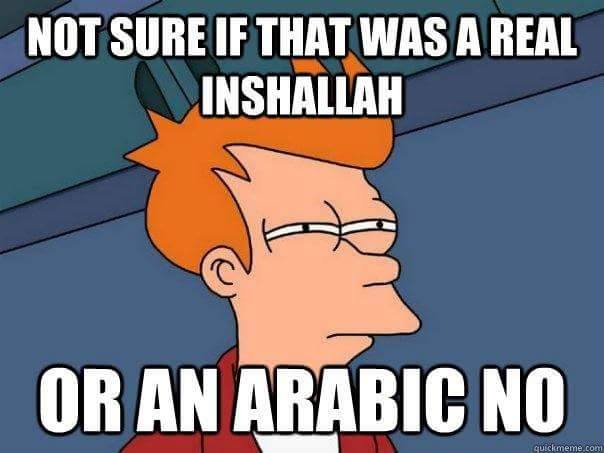If you are preparing for a trip, or you have already been to the Middle East. Or perhaps you have Muslims in your circle of friends, you will probably have heard the word:
Insha'Allah
This word is not used just in the Middle East, but by Muslims all across the world. The word is ubiquitous in the Muslim world and today I would like to demystify it a bit for you...
I have noticed Westerners sometimes look a little worried when we use the word... I think you are probably wondering:
Does this mean he doesn't really intend to meet me tomorrow at x o'clock?
Does "Insha'Allah" indicate a lack of intent from the person who is saying it? A almost pre-prepared excuse for not showing up or being late?
Well, the answer is NO!
When Muslims use the word Insha'Allah we are saying - God Willing.
What we mean is that we have every intention of following the plan we have agreed together, such as meeting up tomorrow at x o'clock. However, we acknowledge at the same time that sometimes things happen that prevent us from doing what we intend to do and we acknowledge that we believe if something does happen (a car accident maybe, or a late bus etc), this event was out of our control and was within God's control. Thus, we accept the event for the best, even if our plans are changed or prevented.
We mean when we say "Insha'Allah" that we will do our utmost to follow the agreed plan, but if we are unable to, due to unforeseen events, we accept that turn of events. We don't get mad and we hope you don't either!
When we discuss plans with others we cannot NOT say "Insha'Allah" because that is almost like asking God to remind us who is in charge (by making sure said event happens to prevent the meeting). We see it like, if we want our plans to go as we want, we MUST say Insha'Allah and acknowledge our plan will only go the way we want if God agree's.
We acknowledge the ultimate plan is with God. We make choices, plans and we strive. We don't see ourselves as helpless in the face of "fate". However, when things go wrong we accept them. We accept our plans have not gone wrong because of our own failing or because of misfortune, rather we think God's plan was different and God knows best. We believe we perceive the event as negative because our perception in limited. We have faith that in the end, the event we did not plan for, will be best for us even if we don't know how at that given point in time.
We also say "Insha'Allah" when we are talking about things we would like to happen but we have no definite plan for them yet. For example a guest in Wadi Rum might say to their guide:
Well, if you ever do come to Europe you must come and visit me!
Your guide will likely say "Insha'Allah". This doesn't mean he doesn't want to, rather than this is an abstract desire, which has no active plan in place yet. He would hope to have the opportunity one day to travel but has no means to, at the time of the conversation.
Lastly, in conversation someone might be suggesting something to us we don't really want to do. We might then say to them about their idea: "Insha'Allah". We don't like to say no, or "I don't like your idea" to people. If it is something we don't want to do then the plan would never get beyond "Insha'Allah". We wouldn't go on to make definite plans. Such as:
Okay lets meet tomorrow at x o'clock, Insha'Allah.
Once, a plan becomes a definite form then Insha'Allah doesn't mean no!
I hope you have enjoyed reading about the word Insha'allah and:
INSHA'ALLAH WE WILL SEE YOU IN WADI RUM SOON!
Lets, make a plan! : D.

